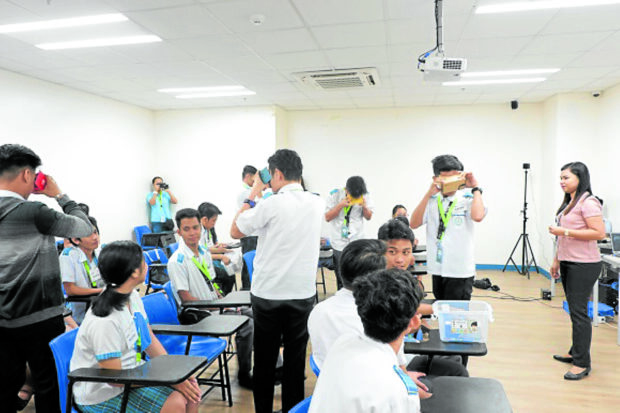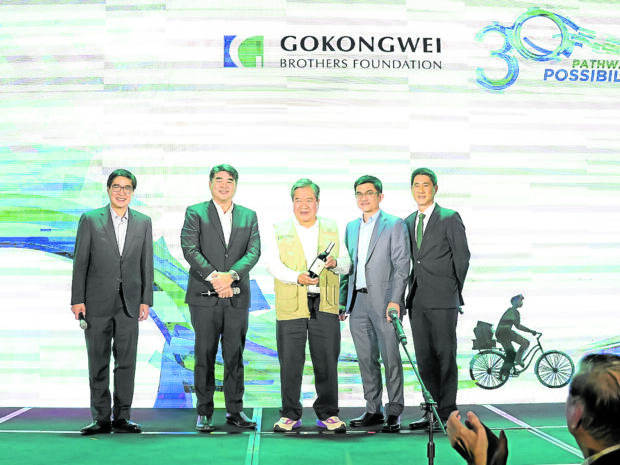For telcos, future-proofing can start in STEM classes

EYES ON THE FUTURE Students at Parañaque National High School check out a virtual
technology gadget. Amid the so-called brain drain, the country’s telecommunications industry
is pinning its hopes on a “well-stocked” pool of talents, even specialists, coming from the ranks
of fresh graduates. —PHOTO FROM THE DEPARTMENT OF SCIENCE AND TECHNOLOGY
Some companies are investing in education to future-proof their businesses or to ensure the sustainable growth of the country and their enterprises.
For PLDT and Smart Communications, support for education protects their future by providing them a “well-stocked” pool of skilled workers, even specialists, who will fill their specific needs for human resource now and in the future.
The Gokongwei group of companies, through the Gokongwei Brothers Foundation (GBF), is promoting STEM (Science, Technology, Engineering and Mathematics) education to contribute to nation-building.
Averting shortages
PLDT-Smart has just marked the 20th anniversary of SWEEP, or the Smart Wireless Engineering Education Program. The longest-running industry-academe linkage program, SWEEP helps schools produce industry-ready engineering and information technology (EIT) graduates, or technopreneurs.
On its 30th anniversary recently, GBF reaffirmed its commitment to promote STEM by providing assistance to teachers, students and schools.
SWEEP basically guarantees PLDT and Smart that they will have a pool of competent and well-trained people to fill vacancies and newly created jobs as they continue to expand. By helping increase the number of competent EITs, the telco firms are assured of a steady and reliable supply of people with the right skills, attitudes and training for their current and future requirements.
Stephanie Orlino, assistant vice president and head of stakeholder management team at PLDT and Smart, noted that in 2003, as the firms transitioned from analog to digital and needed trained people to effect the move, they were losing engineers to foreign employers.
“We turned to schools to [meet our requirements] but new graduates lacked the skills and relevant education [that the companies needed],” she said. The firms decided to embed the training needed by potential employees into the schools’ curriculums.
PLDT and Smart laboratories were set up anywhere the firms operated to provide the proper training. Orlino said, in effect, both teachers and students did on-the-job training (OJT). Faculty members were trained by PLDT and Smart engineers so they would be able to impart more practical and current knowledge of the work ahead, instead of relying totally on textbooks.
Roderick Santiago, head of network at PLDT and Smart, said the telecommunication companies invested in people to maximize and optimize their existing assets. Preskilling, upskilling and reskilling would achieve this goal.
READ: PLDT launches ‘sovereign cloud’ for sensitive, critical gov’t data
READ: Poe tells DICT, DepEd, telcos to boost links for free public school wifi
Seed money, too
The program’s efficiency and impact may be exemplified by Philip Adrian “Chino” Atilano, founder and chief executive officer of TimeFree Innovations, Inc. which, among other things, systematized the queuing practice so people no longer have to simply stand in line not knowing when they will be served or how long they should wait.
The simple system of issuing numbers gives people a better idea if they have time to do short errands or have a meal or snack before their number is called.
Atilano’s alma mater, Ateneo de Zamboanga University, happened to be a SWEEP partner and so he took advantage of the opportunity. “I learned so much from the [SWEEP] workshops,” he said.
Smart not only offered Atilano a job but also supported his start-up by providing him seed money. Based on his experience, Atilano said Filipinos could use and apply world-class technologies. “They only need a little push” to show their capabilities, he added.
Industry-ready grads
Cathy Yap-Yang, first vice president and head of group corporate communications at PLDT and Smart, said, “When we launched SWEEP … our dream was to make bold changes in the industry, by promoting a culture of innovation in schools and by encouraging more Filipino students to get into STEM and ICT-related (Information and Communication Technology) courses.”
The PLDT Group continues to underscore the value of inclusive learning and industry-academe linkages like SWEEP, particularly to promote STEM education in the country. It aims to help narrow the digital divide by creating more STEM experts and upskilling more Filipinos toward jobs of the future.
In its two decades of existence, SWEEP has become an avenue for long-term learning and discovery about technology and a catalyst for growth and development among the youth.
Santiago said, “We continue to work closely with the country’s leading colleges and universities. We have likewise succeeded in producing industry-ready graduates to meet the increasingly digital demands of our customers, our communities and our country.”
He said there might be a need for a program to encourage students at a younger age to consider STEM careers.
“We believe that continuous learning and exposure to emerging technologies, through SWEEP, can equip the youth to find innovative solutions that can help create positive impact for present and future generations,” Orlino said.
Program for educators
While it would be unrealistic to expect to stem the brain drain or outward flow of Filipino talents, as people would naturally look for better opportunities, Orlino said by equipping more people with the skills to perform technical jobs available locally, they would create a pool who could readily fill vacancies left by those who seek greener pastures elsewhere.
The PLDT Group officially celebrated SWEEP’s anniversary with a learning and networking summit, SWEEP@20 and beyond, for partner schools.
On its part, GBF’s goal is to make a lasting impact on education in the Philippines.
The GBF founders all believed education could be the foundation of a strong Philippine economy so GBF has pursued in the past 30 years or so its mission to build the future, specifically through STEM. It started the observance of its 30th anniversary last year by launching its flagship program for educators, The GBF Class Builder, that would enable teachers to deliver great lessons by helping them master their craft.
The GBF Class Builder will provide training and coaching to STEM teachers in crafting their lesson plans.
“Through The GBF Class Builder, we envision our teachers to be more confident and effective in class, more ready to face the challenges of the future, while enjoying every class —feeling proud to be a teacher,” said Grace Colet, GBF executive director.
She said improved student performance was the end goal of the initiative that recognized educators as heroes of change who played a crucial role in nurturing Filipino learners, the future leaders and the workforce.
The program was developed with the help of IDEO, a global innovation company and leading proponent of design thinking.

BAND OF BROTHERS The Gokongwei Brothers Foundation (GBF): (From left) Lance Gokongwei,
chair; Patrick Henry Go, treasurer; James Go, president and surviving founding brother of GBF;
Brian Go, chief finance officer of JG Summit Holdings Inc.; and James Johnson Robert Go Jr., son
of GBF trustee —CONTRIBUTED PHOTO
Gokongwei legacy
Businessman and philanthropist John Gokongwei Jr. and his brothers Johnson, Henry and James established the GBF in 1992. James, the only surviving brother, is president of GBF.
John’s daughter Robina, GBF secretary, said their father “really loved this country” and her sister Lisa, GBF general manager, said he wanted to give back to the Philippines for all the good things he had.
Lance, John’s son and GBF chair and head of the Gokongwei Group, added that their father was happy to be building something. His late father, Lance said, believed business had a greater purpose, hence, the philanthropy.
The sons of the other Gokongwei brothers, Patrick, Bobby and Brian Go, in paying tribute to their respective parents, declared that their fathers shared eldest brother John’s deep commitment to promote education believing that it was the most effective way to lift people up.
“Through the years, we have been striving for the advancement of STEM education, believing this is the driving force behind sustainable national development,” Lance said.
“By equipping learners with quality STEM education, we prepare them to be digitally adept workers, critical thinkers and innovative problem-solvers who can contribute to the growth of their communities,” he added.
Partner school heads— namely Fr. Bobby Yap, SJ, Aeneo de Manila University president, and Bro. Bernie Oca, FSC, De La Salle University president —said GBF endowments had played a huge role in the educational formation of many Filipino professionals.
Lisa, who launched the first Omnibus Partnership between GBF and the Department of Education, exhorted the audience at the anniversary celebration to continue with GBF “on the path of solidarity and commitment toward our shared mission of building the future through education.”